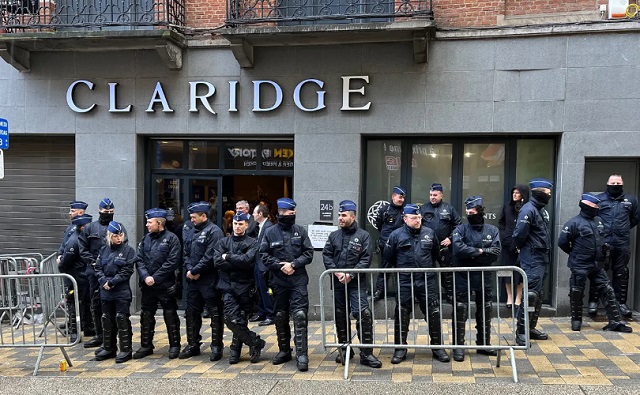International
Brussels NatCon conference will continue freely after court overturns police barricade

From LifeSiteNews
Condemnation of Mayor Kir’s crackdown on NatCon was wide-ranging, and not merely from the dignitaries speaking at it. The British prime minister’s deputy spokesman called the scenes “extremely disturbing.”
Thanks to a successful challenge from pro-freedom legal organization ADF International, a Belgian court has struck down an order from the local authorities which saw an “international incident” created after police blockaded the National Conservatism conference in Brussels, Belgium yesterday.
In an early morning announcement April 17, ADF International announced that a Belgian court “has struck down state censorship,” thus allowing the National Conservatism (or NatCon) conference to proceed undeterred into its second day today.
Via a press statement, ADF International wrote:
In the decision, considered a victory for free speech, the court decided that ‘Article 26 of the Constitution [of Belgium] grants everyone the right to assemble peacefully,’ and although the mayor has the authority to make police ordinances in case of ‘serious disturbance of the public peace or other unforeseen events,’ in this case there was no sufficient threat of violence to justify this.
The Court reasoned that ‘it does not seem possible to infer from the contested decision that a peace-disrupting effect is attributed to the congress itself.’ Rather, as the decision notes, ‘the threat to public order seems to be derived purely from the reactions that its organization might provoke among opponents.’
READ: Socialist Belgian mayor orders police to shut down event featuring Cardinal Müller, Orbán, Farage
The Brussels NatCon conference currently taking place was catapulted to the fore of international headlines on Tuesday, when local police moved to shut the event down, under orders of the local mayor.
As LifeSiteNews reported, the Socialist mayor of the Saint-Josse-ten-Noode municipality – Emir Kir – ordered the police to shut down the two-day conference to “guarantee public safety.”
Footage and images flooded social media around midday, showing lines of police barricading the conference venue, prohibiting anyone from entering. Those already inside were not allowed back in if they left.
The conference is hardly a fringe event. High-profile guests and speakers include Vatican prelate Cardinal Gerhard Müller, Hungary’s Prime Minister Victor Orbán, former Polish Prime Minister Mateusz Morawiecki, former French presidential candidate Eric Zemmour, former U.K. politician and Brexit campaigner Nigel Farage, and previous U.K. Home Secretary Suella Braverman.
The police clampdown was initiated as Braverman was arriving and Zemmour was refused entry by the police.
NatCon organizers also stated that the catering had been canceled, and participants only had limited access to water and food as the police were preventing the delivery of supplies. Those still effectively locked inside the conference venue by nightfall were able to partake of a gala dinner, and then left the building.
Today, we overcame attempts by Brussels authorities to silence us and had a wonderful Day One of NatCon Brussels 2. See you again tomorrow! pic.twitter.com/NO9I3CbnUl
— National Conservatism (@NatConTalk) April 16, 2024
Paul Coleman, ADF International’s executive director, shared an English translation of the police order on X yesterday afternoon. The mayor’s order cited the “ethically conservative” position espoused by speakers at NatCon, “e.g., hostility to legalized abortion, same-sex unions, etc.,” along with a “Eurosceptic” mindset among his reasons for deploying the police.
The conference, being held on premises operated by Claridge Events, had already been forced to find new venues on two occasions in the preceding days, as pressure was placed on them to cancel the conference due to its promotion of “conservative” talking points.
The Claridge venue was the third home for the event. NatCon’s hastily found backup venue broke “its written contract” to host the event on Monday night, according to NatCon organizer Yoram Hazony, hours before the conference was scheduled to begin Tuesday morning.
Welcoming the court ruling to allow NatCon to proceed unimpeded, Coleman stated:
While common sense and justice have prevailed, what happened yesterday is a dark mark on European democracy. No official should have the power to shut down free and peaceful assembly merely because he disagrees with what is being said. How can Brussels claim to be the heart of Europe if its officials only allow one side of the European conversation to be heard?
Coleman attested that Tuesday’s “kind of authoritarian censorship we have just witnessed belongs in the worst chapters of Europe’s history. Thankfully, the Court has acted swiftly to prevent the repression of our fundamental freedoms to both assembly and speech, thus protecting these essential characteristics of democracy for another day.”
Condemnation of Mayor Kir’s crackdown on NatCon was wide-ranging, and not merely from the dignitaries speaking at it. The British prime minister’s deputy spokesman called the scenes “extremely disturbing.”
“The Prime Minister is a strong supporter and advocate of free speech and believes it is fundamental to any democracy,” the spokesman added.
According to author and NatCon speaker Rod Dreher, Cardinal Müller went so far as to say the Belgian police action was “like Nazi Germany.”
Just spoke to Cardinal Müller, who was visibly shocked by the police standing a few feet away, blocking entrance to NatCon. “This is like Nazi Germany,” he said. “They are like the SA.” (He gave me permission to quote him.) pic.twitter.com/TTX8lc8MQS
— Rod Dreher (@roddreher) April 16, 2024
Belgium’s pro-EU Prime Minister Alexander De Croo also condemned the actions taken by local police, in a signal move made against the local mayor. Writing on X yesterday evening he stated that “[w]hat happened at the Claridge today is unacceptable. Municipal autonomy is a cornerstone of our democracy but can never overrule the Belgian constitution guaranteeing the freedom of speech and peaceful assembly since 1830. Banning political meetings is unconstitutional. Full stop.”
What happened at the Claridge today is unacceptable. Municipal autonomy is a cornerstone of our democracy but can never overrule the Belgian constitution guaranteeing the freedom of speech and peaceful assembly since 1830. Banning political meetings is unconstitutional.Full stop.
— Alexander De Croo 🇧🇪🇪🇺 (@alexanderdecroo) April 16, 2024
International
Trump puts new price tag on Canada joining “Golden Dome”

Quick Hit:
President Trump has upped the cost for Canada to join the U.S. “Golden Dome” missile defense program to $71 billion—$10 billion more than his previous ask.
Key Details:
- Trump confirmed the new $71 billion figure while speaking to reporters aboard Air Force One.
- Canada has pushed back, with PM Mark Carney and diplomats calling Trump’s offer a “protection racket.”
- Trump said Canada could access the system for free if it became the 51st U.S. state.
Diving Deeper:
President Trump has put a new and steeper price on Canada’s potential entry into America’s “Golden Dome” missile defense program. Speaking from Air Force One on Monday, Trump told reporters, “They want to be in… Seventy-one billion they’re going to pay.”
That’s a $10 billion increase from the $61 billion figure Trump had previously floated, marking a sharp escalation in his negotiations with Ottawa. The Golden Dome, described by the administration as a “state-of-the-art” defense shield, aims to protect North America from a new era of missile threats—particularly those posed by China, Russia, and North Korea.
Trump has framed the Golden Dome as the long-awaited realization of Ronald Reagan’s “Star Wars” vision, using space-based sensors and interceptors to strike down incoming ballistic, cruise, or hypersonic missiles. Development timelines suggest full deployment is still 5–7 years off, but an initial $25 billion is already allocated in next year’s defense budget. The entire project may run upwards of $175 billion, with some estimates as high as $542 billion over 20 years.
Canada, which has long partnered with the U.S. under NORAD to detect airborne threats, has expressed interest in joining the project. But Trump is demanding a separate, costly buy-in. He reiterated that Ottawa would “have to pay a lot of money” to participate unless it pursued a full political union with the U.S. “It would be free if Canada became the 51st state,” he added.
Canadian leaders have pushed back hard. Prime Minister Mark Carney, re-elected in April after campaigning against U.S. interference, said Canada wants to protect its citizens but not under terms dictated from Washington. Ambassador to the U.N. Bob Rae went further, calling Trump’s offer a “protection racket.”
conflict
Trump dismisses US intelligence that Iran wasn’t pursuing nuclear bomb before Israeli attack

From LifeSiteNews
By Dave DeCamp
When asked about Tulsi Gabbard’s assessment, President Trump said, ‘I don’t care what she said. I think they’re very close to having [a nuclear weapon].’
Ahead of Israel’s attacks on Iran, U.S. intelligence assessed that Iran was not pursuing nuclear weapons and that even if it chose to do so, it would take up to three years for Tehran to be able to produce and deliver a nuclear bomb against a target of its choosing, CNN reported on Tuesday, citing people familiar with the intelligence.
The U.S. assessment goes against the claims from Israeli Prime Minister Benjamin Netanyahu, who launched the war under the pretext of preventing Iran from obtaining a nuclear weapon. But President Trump appears to be taking Israel’s word over his own intelligence agencies, as he told reporters that he didn’t care about his director of national intelligence’s assessment on the issue.
In March, DNI Tulsi Gabbard said that “Iran is not building a nuclear weapon and Supreme Leader Khamenei has not authorized the nuclear weapons program he suspended in 2003.” Her assessment was reflected in the Intelligence Community’s annual threat assessment.
When asked about this assessment, President Trump said, “I don’t care what she said. I think they’re very close to having [a nuclear weapon].”
Netanyahu claimed in an interview on Sunday that he shared intelligence with the U.S. that Iran could have developed a nuclear weapon within months or a year, although that was not the conclusion of U.S. intelligence agencies, based on the CNN report. But even based on Netanyahu’s own timeline, the U.S. would have had time to continue negotiations with Iran.
Israel attacked Iran two days before another round of negotiations between the U.S. and Iran was set to be held. Trump had been demanding that Iran eliminate its nuclear enrichment program, which was a non-starter for Tehran. Despite the apparent impasse, Iran was set to present a counter-proposal to the U.S., but the talks were canceled after Israel launched its war.
Reprinted with permission from Antiwar.com.
-

 Energy2 days ago
Energy2 days agoKananaskis G7 meeting the right setting for U.S. and Canada to reassert energy ties
-

 Business2 days ago
Business2 days agoCarney’s Honeymoon Phase Enters a ‘Make-or-Break’ Week
-

 Alberta2 days ago
Alberta2 days agoAlberta announces citizens will have to pay for their COVID shots
-

 conflict2 days ago
conflict2 days agoIsrael bombs Iranian state TV while live on air
-

 Business2 days ago
Business2 days agoCarney praises Trump’s world ‘leadership’ at G7 meeting in Canada
-

 conflict2 days ago
conflict2 days agoTrump leaves G7 early after urging evacuation of Tehran
-

 Business1 day ago
Business1 day agoThe CBC is a government-funded giant no one watches
-

 conflict1 day ago
conflict1 day agoMiddle East clash sends oil prices soaring






